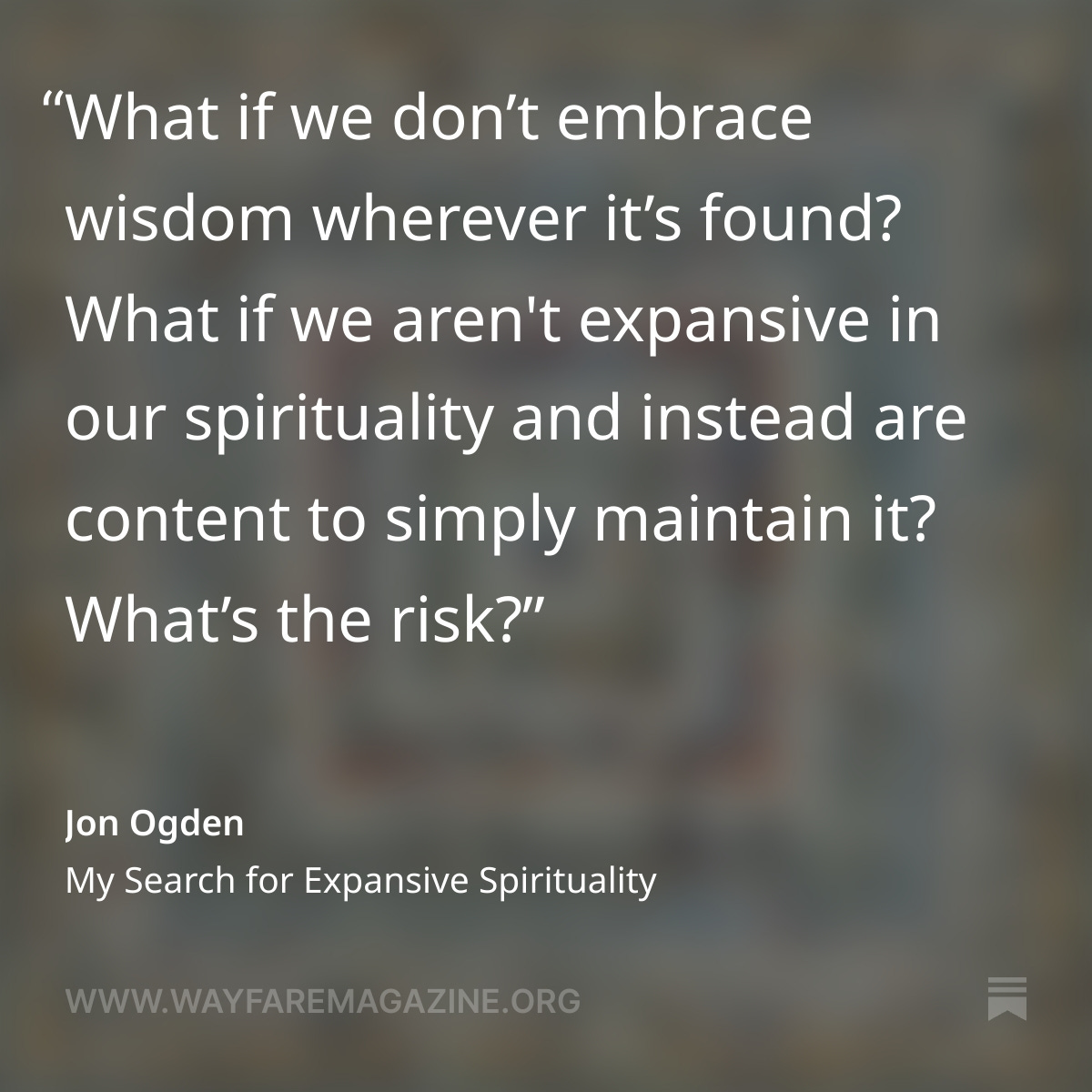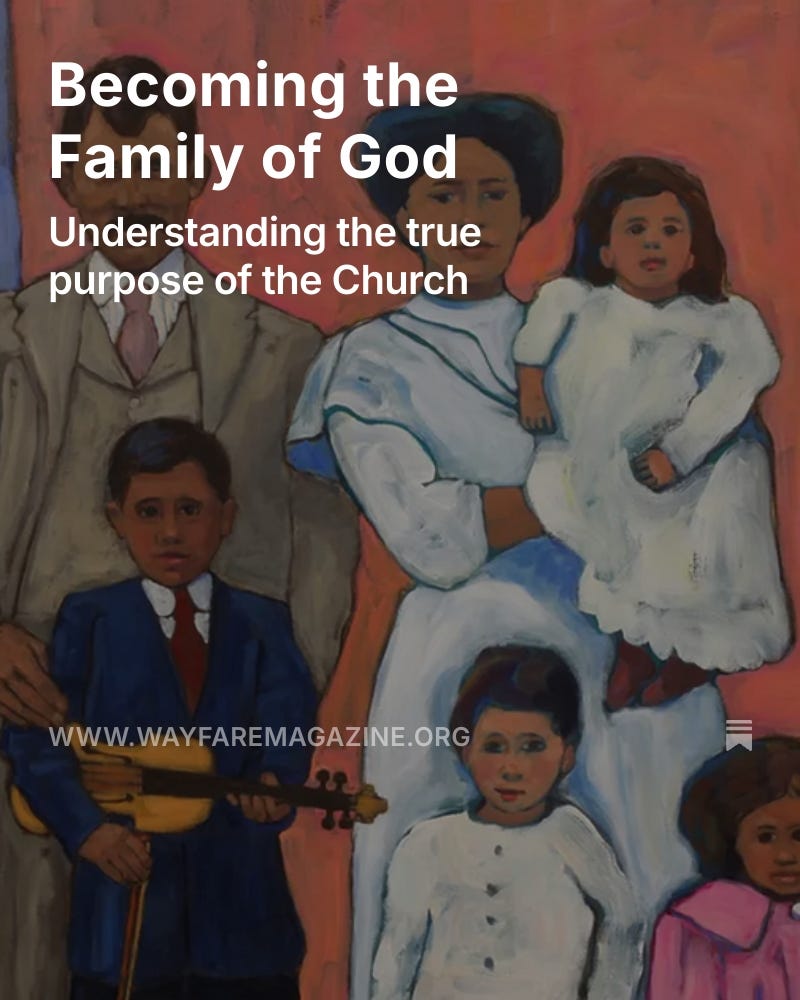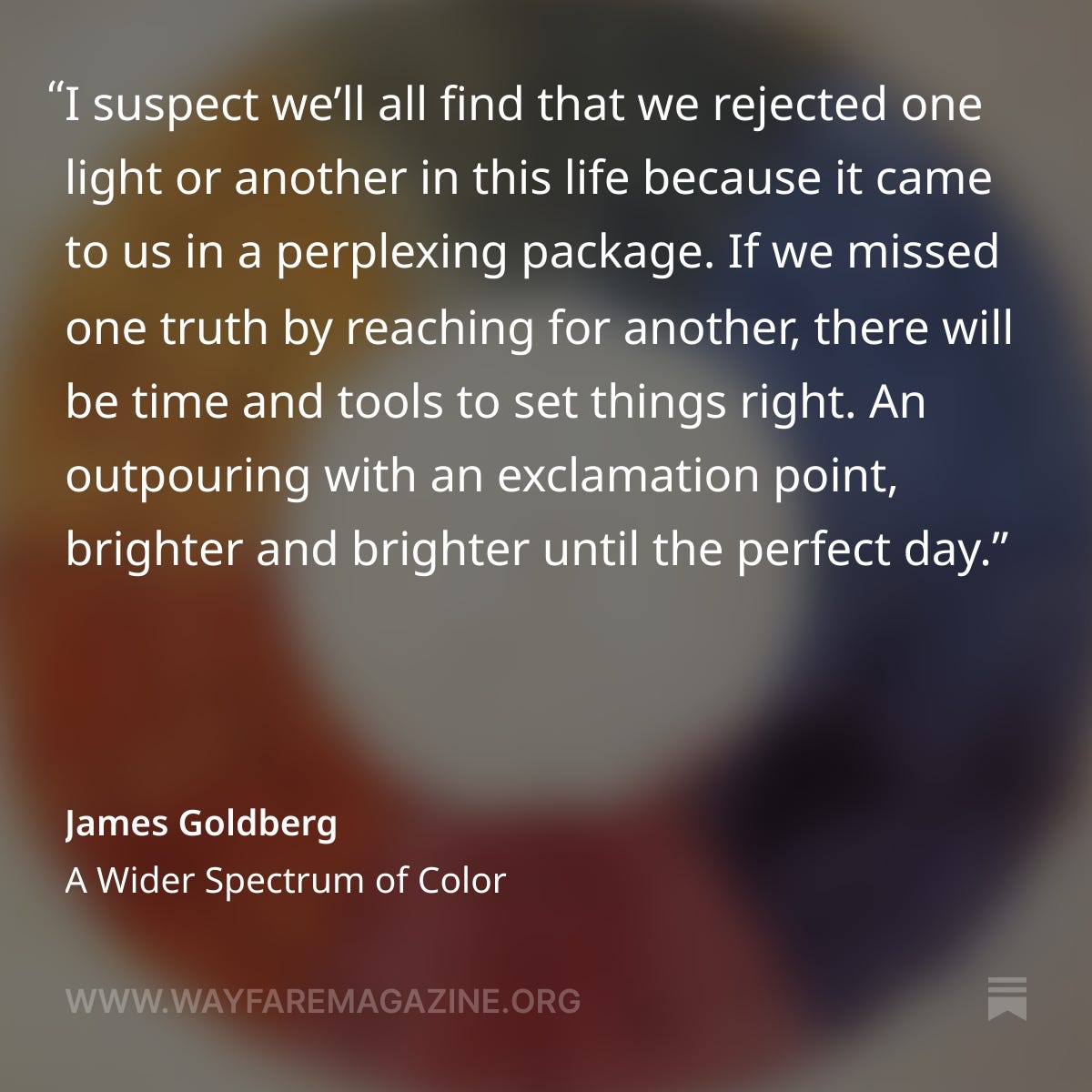What if Heaven is grander and broader and more inclusive than we imagined? What if God is more merciful and just than we can comprehend?
Faith Matters resources to accompany your Come Follow Me study: July 7-13
Salvation comes through Jesus Christ, the Son of God. Jesus Christ is my Savior.
I think today we often read Section 76 as a bunch of rules and a bunch of gatekeeping: “These are the people who go to this kingdom. These are the people who go to this kingdom. Which one are you in?” And it seems a lot like the way that most other Christians think about heaven and hell. “Are you in? Are you out? What's the line?” We just added one to the mix; we went from two to three.
But when the revelation was received in 1832, it's called The Vision, and when Joseph Smith announced it to the Church, there were a lot of people who left the Church. Why? Not because of the arbitrary rules, but because they thought it was too universalistic. It's so interesting that we've sort of flipped our reading of section 76. Instead of sort of being awestruck by the expansiveness of it, the generosity of it, we read it a different way. …
As I look over the course of Joseph Smith's life and the revelations that come to him… if you look at the Book of Mormon, it looks like a pretty traditional heaven and hell, right? There's no three degrees in there. So from 1830 with the Book of Mormon, through The Vision, through all these other things we're talking about, section 130 comes in Nauvoo, then you get to King Follett at the end of his life… it's like the vision of heaven is just growing bigger and bigger and bigger, and God's saving power is becoming more and more generous.
And personally, I think this is part of the unfolding of the restoration. I think it's really reflecting on what it means to believe in a Savior who performs an infinite and eternal atonement, not a limited and finite one.
How does God continue to teach us, work with us? What does God's infinite and eternal saving work look like?
—Patrick Mason, “Who is the Church for?”
Terryl Givens: Peaceable Things: Three Names of Christ
Creator, Emmanuel, Paraclete: taking us on a journey through the scriptures and Early Church theologians, Terryl Givens opens a wealth of insight into the significance of these three names of Christ and what they mean for our faith today.
I can understand God’s will “by the power of the Holy Spirit.”
We want to think that what we believe in, what we cherish, those things are eternal. … I think Joseph really challenged his followers by often shaking the ground on which they stood and calling them in new directions. A lot of men and women followed him to a certain point, but then found that they couldn't go any further. Change is tough. And so Joseph was a really challenging religious leader. He wasn't easy to follow, but thousands of people did. And millions of people continue to both appreciate and wrestle with his legacy.
—John Turner
Exaltation is the highest form of salvation.
My Heavenly Father wants me to receive eternal life in the celestial kingdom. Heavenly Father wants me to return to live with Him forever.
One interpretation of the vision Joseph Smith and Sidney Rigdon recorded in Doctrine and Covenants 76 is that the average person who drifted out of the faith will be received into a brilliant heaven, finding rest in Jesus’s arms and dwelling forever in his presence—but without a celestial degree of glory. It strikes me, writing this, that it’s a little odd that this prospect is what keeps many Latter-day Saint parents up at night, wringing hands over their children who didn’t keep expectations about faith or life choices. What if all those children rise to is a heavenly bliss beyond all human description? How disappointing.
Maybe what we fear is not the hell we don’t believe in, or the terrestrial glory we teach, so much as children not growing up to be all we want them to be. Sometimes the spiritual appeal of the celestial kingdom gets its wires crossed with the more worldly hope that our children will live out our own vision of success. That is human. The longing for a perfect family photo with matching clothes and beliefs.
Fortunately, the sorrow that comes with broken expectations is thoroughly treatable. It’s OK to mourn a lost story for a night, if you’re willing to find a new one in the morning. … Our earthly worries over unconventional children can be eased simply by learning to appreciate what they do rather than dwelling on what they don’t.
If it’s really the difference between heavens we’re worried about, though, a person like Jay winding up locked in terrestrial glory is hardly the most likely scriptural possibility. Another model, taken from Doctrine and Covenants 88, is that there is no space without a kingdom, and no kingdom without space. In that view, we don’t need to imagine souls landing forever on the other side of a border between heavens because the combination of their life experience and the era in which they lived made it more challenging for them to stay in the Church. We can trust that light clings to light, and mercy to mercy. If the vision of three kingdoms is a simplified model (like Bohr’s version of the atom) rather than a reality with borders and checkpoints, then what I expect for my Uncle Jay is that his willingness to embrace light—any sort of light—in this life will open the door to a continued outpouring in the next. There may be truths and ordinances that shine brighter for him when the dross has passed away. I suspect we’ll all find that we rejected one light or another in this life because it came to us in a perplexing package. If we missed one truth by reaching for another, there will be time and tools to set things right. An outpouring with an exclamation point, brighter and brighter until the perfect day.
—James Goldberg, “A Wider Spectrum of Color”
Justin Dyer: Be ye Therefore a Perfectionist?
In this conversation, Justin shares some compelling research, including the striking finding that high levels of toxic perfectionism can triple the likelihood of leaving one’s religion. He offers some profound insights into why this is the case and he talks about gospel principles that could help us replace unhealthy perfectionistic beliefs.
Most importantly, Justin offers practical, hopeful steps for healing from perfectionism, embracing a view of self-worth firmly rooted in God’s infinite love. He also shares a vision for how we can help our wards to become a place of healing and welcoming where everyone can feel like they belong.
Bonnie Young: Damned by Perfection
This is the story of how my perfection almost damned me. That is, how my relentless quest for flawlessness undermined my happiness, my health, my orientation to the world, and my faith. It is a story, too, of a girl becoming a woman and in the process making room for grace.
There might be there might be a time where I need to hear the message, or I feel inspired to deliver the message to a friend, my family, maybe over the pulpit of like, Hey, what we do really matters. Christ said come follow me, and that includes commitment. Discipleship includes a radical reorientation of your life. Repentance is one of the core principles of the gospel. This matters. And, it's an infinite eternal atonement where Christ's arms are always open.
Or the other way is, Hey, wow, don't we have an amazing loving God who's created a plan of salvation in which he wants to save all the works of his hands? (That's one of the lines from section 76, right? It doesn't get any more expansive than that.) So absolutely rest, revel, enjoy the liberty that comes from from being in a relationship with such a loving God. And guess what? God also wants you to be better.
And so I think we just I don't think we should be paralyzed by the paradox. We should use it constructively and recognize that God has always given us both sides of the coin because he wants to love us and he wants us to be better than we are today.
—Patrick Mason, “Who is the Church for?”
We've traced the history of how LDS prophets have understood the scope of God's capacity to exalt us. And we try to be clear in all our work, we're not proclaiming doctrine, but we are reconstituting history, and excavating history, and celebrating that history. And Joseph Smith clearly believed that we would continue to progress indefinitely until we all find ourselves back in God's presence. I mean, he was very clear about this. And the scriptural record seems to affirm this in his own life.
In section 76, he sees the characterizations and qualifications for the various degrees of glory. He had been traumatized by the death of Alvin. When it comes to the terrestrial kingdom, he reads or hears that that's where the honorable men of the earth who died without a knowledge of the gospel would go. And it seems clear by by context that he would have assumed, “thank goodness, Alvin is at least in that kingdom.”
And I think it's important, again, Joseph is working from a particular paradigm. He's working from a paradigm that if you die unbaptized and un-catechized, you go to hell and you never come out of it. And that's the paradigm in which he's working. So at least it's progress to make it a terrestrial kingdom.
He knows Alvin. He knows Alvin was a beautiful, noble and great man. So the relief, but then the shock in [section] 137, a few years later. And he uses the word amazed, I think this is a wonderful thing, that the prophet himself finds himself amazed to see Alvin in the celestial kingdom.
And so we think that that's the moment when it was confirmed in his mind that God would never shut the door, as Elder Hales has said. …
Brigham Young explicitly said that we would all progress bit by bit until we find ourselves back in God's presence. Hyrum Smith said that like the moon that can wax and wane, kingdoms are fluid. James Talmadge in the first edition of the Articles of Faith said, of course we can progress from kingdom to kingdom, God will never limit the extent of our ability to repent.
… The church does have an official position on this, and the official position is we have no official position. And they've stated that twice. So it is not church doctrine that you cannot progress, nor is it doctrine that you can. So we, in our own personal discipleship, are committed to a reading of Church history and scripture in which God will never shut the door of his heart and that there will eventually be no empty chairs at the table.
—Terryl & Fiona Givens, “All Things New”
We are all children of God.
Part of what we're trying to track in this most recent book is how does the paternal nature of God get warped and transformed into belief in a sovereign God, a ruler God, a kingly God who has dominion over subjects, rather than fatherly concern over a child.
In some ways, the most remarkable thing about the restoration is that it takes us back and says, no, paternal isn't just a metaphor. We're not just talking about analogies here. It's literal, and all kinds of gospel doctrines become radically re-conceived if you take that literally.
…Elder Hales said, I plead with you, never, never, never shut the door of your hearts to your children. And I thought, well, if we take that as inspired admonition, then certainly we would have to presume that our father would never shut the door of his hearts to us.
And suddenly the notions of judgment, of the hereafter, of eternal progression, take a radically different complexion if we believe God is not a sovereign giving his subjects one last chance, but he's a father who would never give up on a child. It changes everything. And I love the fact that our scriptures are so redolent to these truths.
—Terryl & Fiona Givens, “All Things New”
We know that Heavenly Mother is involved in our lives. We know that she cares about us. We know that she can reach out to us. We know this from people we trust. Elder Holland and Patricia Holland have said these beautiful things about our heavenly parents reaching out to us—parents, both.
—McArthur Krishna, “Celebrating Our Divine Mother”
Elder Jeffrey R. Holland has written how important his own children are to him and his wife. And yet he asks that if they, as parents, “can love so much and try so hard, what does that say of a more Godly love that differs from our own as the stars differ from the sun? On a particularly difficult day, . . . what would this world’s inhabitants pay to know that heavenly parents are reaching across those same streams and mountains and deserts, anxious to hold them close?”1
—“A Mother There”: A Survey of Historical Teachings about Mother in Heaven
Studying the scriptures can help me “understand the things of God.”
Adam Miller & Rosalynde Welch: How to Have a Conversation with God
Today, we’re so excited to welcome Adam Miller and Rosalynde Welch to talk about their brand-new book, Seven Visions. This book is an exploration of seven visionary experiences in the Doctrine and Covenants—moments where heaven and earth meet in powerful and sometimes surprising ways. Through these visions, Adam and Rosalynde invite us to consider how we engage with scripture and revelation in our own lives.
In this conversation, we explore what it means to truly see God’s face and hear god's voice and that so often, revelation comes by paying attention to what is closest to us—the relationships and experiences that challenge us, stretch us, and ultimately transform us.
Adam and Rosalynde suggest that rather than treating scripture as something fixed and unchanging, we can approach it as an active, unfolding conversation. As Rosalynde put it, “The meaning of scripture is not fixed inside the covers of the book, but it unfolds in the space between the reader and the text.” We love their insights about passages of scripture that feel unsettling. Could our discomfort itself be a catalyst for revelation? And could the very questions we feel most compelled to ask be what expands our capacity to recognize Christ as He truly is—and to see the world more as He sees it?
This was such a rich and expansive conversation, and we hope it gives you a new lens for engaging with scripture and revelation
Adam Miller and Rosalynde Welch: Seven Gospels
By slowing down with the scriptures and zooming in on details—even supposedly mundane ones like punctuation and phrasing—scripture can teach us things we don’t expect to learn. Just as there are a multiplicity of witnesses of Christ in the Book of Mormon, Adam and Rosalynde make a case that our scriptural canon is a springboard to endless interpretations that speak to us according to our spiritual needs.
“To my beloved Pat and me, our children are more precious possessions than any crown or kingdom this world could offer. There is literally not anything in righteousness we would not do for them; there is no stream so deep nor mountain so high nor desert so wide that we could be kept from calming their fears or holding them close to us. And if we "being evil" can love so much and try so hard, what does that say of a more godly love that differs from our own as the stars differ from the sun? On a particularly difficult day—or sometimes a series of difficult days—what would this world's inhabitants not pay to know that heavenly parents are reaching across those same streams and mountains and deserts, anxious to hold them close?” Jeffrey R. Holland, "Belonging: A View of Membership," Ensign (April 1980)













